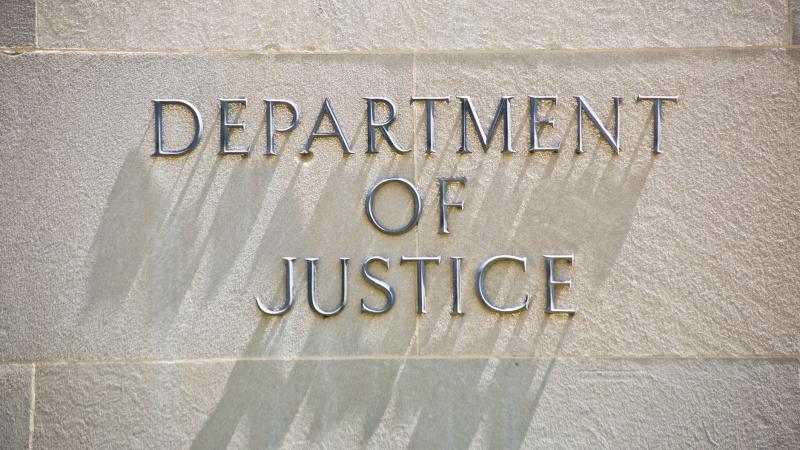DOJ says foreperson confirmed grand jury approved two-count Comey indictment
The actual transcript from a September 25 discussion between the magistrate judge, the DOJ, and the grand jury foreperson lends credence to Lindsey Halligan's contention that the two-count indictment against James Comey was properly obtained.
The Justice Department has released a transcript from its effort in September to indict former FBI Director James Comey that appears to show the foreperson of the grand jury that voted on and agreed to a two-count indictment against Comey for allegedly lying to and obstructing Congress.
Interim U.S. Attorney Lindsey Halligan and Assistant U.S. Attorneys Gabriel J. Diaz and Tyler Lemons signed a “notice correcting the record” and filed it in federal court on Thursday, providing transcribed evidence that the grand jury, after rejecting one count against Comey, approved two other counts against him. The new effort by the DOJ comes as Comey's lawyers have sought to get the case dismissed and as the judges reviewing elements of the case have seemed open to Comey's arguments.
“The complete record eliminates any doubt: The foreperson confirmed the vote. The Court acknowledged the vote. The Court docketed the two-count true bill as the operative indictment. Only Count One lacked concurrence; Counts Two and Three were true-billed by at least twelve jurors,” the Trump DOJ said in its new court filing. “Accordingly, any assertion that the grand jury ‘never voted on the two-count indictment’ is contradicted by the official transcript.”
Halligan is defending her handling of the grand jury proceedings, which resulted in two criminal charges against Comey, in the wake of critiques from a magistrate judge on Monday and probing questions Wednesday from the federal judge presiding over the case.
The federal prosecutor was selected by Trump in September to lead the U.S. attorney’s office in the Eastern District of Virginia.
The DOJ’s two-count indictment, approved by a federal grand jury in northern Virginia in late September, stemmed from allegations that Comey misled the Senate during his testimony in late September 2020, when he reiterated his May 2017 denial that he had never authorized a leak of information to the media about the Trump-Russia investigation or Clinton-related investigations, when the DOJ says he in fact authorized his friend, confidante, and special government employee Dan Richman to leak to the media about the FBI’s Hillary Clinton investigation.
The indictment also alleged that Comey had obstructed Congress by lying to the Senate.
The foreperson for the grand jury had told the judge in September that, in addition to approving the two charges, “grand jurors did not concur in finding an indictment in this case” related to a third count – the DOJ’s allegation that Comey had also lied when he claimed before the Senate in September 2020 that he did not remember the 2016 CIA referral about the Clinton Plan intelligence seeking to tie Trump to Russia.
The Justice Department argued Thursday that the transcript from the September 25 proceedings in front of Magistrate Judge Vaala showed that the two-count indictment against Comey was properly approved by the grand jury.
“The official transcript of the September 25, 2025, proceedings before Magistrate Judge Vaala conclusively refutes that claim and establishes that the grand jury voted on – and true-billed – the two-count indictment,” the DOJ said, emphasizing that “the Court and the Foreperson Confirmed the Vote on the Two-Count Indictment”
The transcript released by the DOJ from the September 25 proceedings also showed that Vaala asked, “So you voted on the one that has the two counts?”
“Yes,” the grand jury foreperson replied.
The DOJ contended Thursday that “the sworn testimony alone establishes that the grand jury voted on the two-count indictment.” The DOJ added that “the Foreperson explained the separation of the charges and the grand jury's action” back on September 25.
“So the three counts should be just one count. It was the very first count that we did not agree on, and the Count Two and Three were then put in a different package, which we agreed on,” the foreperson said.
The DOJ argued Thursday that “this confirms that the grand jury failed to obtain concurrence on Count One, and that Counts Two and Three were placed into a separate two-count indictment that the grand jury approved.”
“The Court acknowledged that two documents with the same case number had been presented… The Court then identified the issue as a clerical inconsistency relating solely to Count One and directed the foreperson to clarify that only Count One lacked concurrence,” the DOJ said on Thursday when recounting the September grand jury proceedings.
Vaala, according to the transcript, told Halligan at the time that “I assume you intend to make it public, so these both will go on the docket … now that it’s been presented in open court. I just want to make sure that you understand that and that was your intention.”
“Okay,” Halligan said during the September proceedings. “Understood.”
The DOJ said Thursday that “this confirms the Court's recognition that the two-count true bill is the valid, operative indictment.”
Halligan also pushed back on multiple criticisms in Wednesday evening court filings, telling Judge Michael Nachmanoff, who is presiding over the Comey case, that “the grand jury was provided the proposed indictment, deliberated, and determined that probable cause existed to believe that the defendant had committed the crimes charged in two counts” and claiming that Magistrate Judge William Fitzpatrick had misrepresented her comments before the grand jury and that his opinion attacking the Comey case should be set aside.
She had confirmed in federal court on Wednesday that, after the grand jury had rejected one of the three counts against Comey on September 25, the indictment was rewritten that day to include only the two approved charges and to omit the one rejected charge, and that she presented that revised indictment to the grand jury foreperson and one other grand juror — rather than presenting it again to the full grand jury — before providing the indictment to a magistrate judge. The magistrate was given both versions of the indictment — the original one with the rejected count included and the revised one with the rejected count omitted — and the jury foreperson said on the record that the grand jury had approved two counts only.
The successful indictment specified two counts: False statements within the jurisdiction of the legislative branch of the United States Government (18 U.S.C. § 1001(a)(2)) and Obstruction of a Congressional proceeding (18 U.S.C. § 1505).
Nachmanoff, the presiding judge who was nominated to the bench by then-President Joe Biden and confirmed by the Senate in 2021, seemed skeptical of the DOJ in court and had ordered that the DOJ provide answers about this matter by Wednesday evening.
One of Comey’s lawyers, Michael Dreeben, a former member of special counsel Robert Mueller’s Trump-Russia investigation, had claimed in court on Wednesday that the revelation by Halligan meant that there was no legitimate indictment against his client.
Halligan and her fellow prosecutors argued in court on Wednesday that nothing untoward had occurred with the way the Justice Department had obtained its two-count indictment against Comey, and they expanded upon that in a court filing Wednesday evening.
Fitzpatrick, a magistrate and a veteran of the same U.S. attorney’s office in Virginia, issued an opinion harshly criticizing what he saw as Halligan’s mishandling of the grand jury process in late September, accusing her of misleading the grand jurors and concluding that grand jury materials should be handed over to Comey’s defense team.
In a separate Wednesday evening court filing, Halligan and the DOJ prosecutors pushed back on those contentions as well.
Comey, fired as FBI director in 2017 by President Trump, oversaw the politicized investigation into Clinton's use of a private email server to send classified information and the Trump-Russia collusion inquiry.
The charges against him were brought by Halligan, the former personal Donald Trump lawyer and White House aide, who was sworn-in in September shortly before obtaining the indictments against Comey.
The Justice Department had revealed in court filings late last week that the approved congressional obstruction count against Comey not only focuses on the ex-bureau chief allegedly misleading about authorizing media leaks but “also rests on the defendant’s statements to Senators [Lindsey] Graham and [Josh] Hawley regarding his alleged lack of memory on the so-called Clinton plan to ‘tie Trump’ to Russia.”
Special Counsel John Durham’s 2023 public report revealed that “the Intelligence Community received the Clinton Plan intelligence in late July 2016.”
The intelligence related to an alleged plan by the Clinton campaign to attempt to link Trump to Russia and Vladimir Putin in an effort to distract from her private email server scandal. The Durham report showed that Comey was briefed on the Clinton Plan intelligence by then-CIA Director John Brennan in early August 2016 and was also sent a CIA referral memo about the Clinton Plan intelligence in early September 2016.
Nevertheless, Comey repeatedly told the Senate Judiciary Committee in late September 2020 that he did not recall the referral memo from the CIA. The Trump DOJ’s efforts to indict Comey over that piece of his testimony as a third count failed, but it appears the DOJ is incorporating that bit of Comey’s alleged wrongdoing into its grand jury-approved congressional obstruction indictment.
Russiagate-related subpoenas are also being sent out as new revelations indicate that Comey expected Clinton to emerge victorious in 2016, that key information on Crossfire Hurricane and other FBI investigations was hidden in burn bags at FBI headquarters, and that Richman allegedly leaked to the media despite FBI guidelines warning him not to.
The Facts Inside Our Reporter's Notebook
Links
- notice correcting the record
- transcribed evidence
- defending
- indictment
- Dan Richman
- told the judge
- claimed before the Senate
- telling
- claiming
- confirmed
- 18 U.S.C. § 1001(a)(2)
- 18 U.S.C. § 1505
- nominated
- former member
- expanded
- issued an opinion
- court filing
- revealed in court filings
- revealed
- being sent out
- expected
- burn bags
- leaked
- warning















